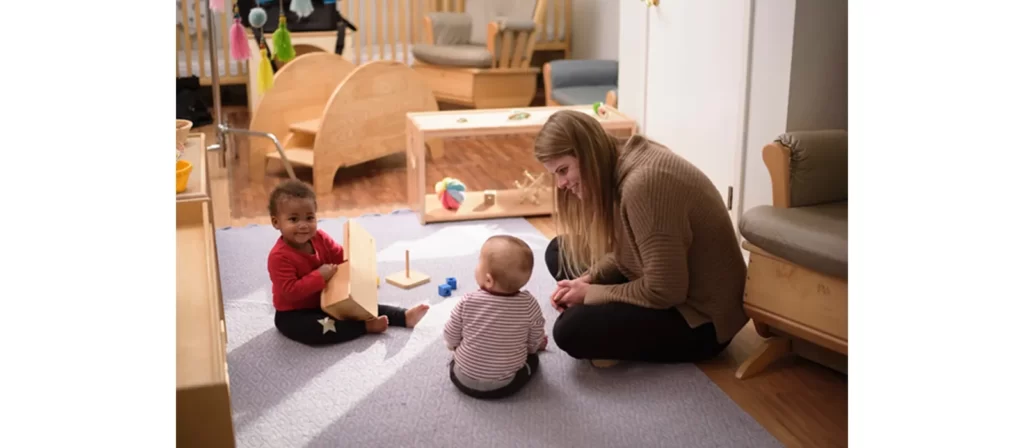As the CEO of Xiha Montessori, with 20 years of experience in Montessori education, I have been understanding and implementing the Montessori Method, a system that deeply honors and nurtures the individuality of each child. In this article, I will elaborate on ten key ways that a Montessori education respects children’s development.
1. Respects Children’s: Listening to Their Opinions
In the Montessori method, children are not only listened to; they are valued and seriously considered. This approach is an integral part of our classroom and teachers encourage children to speak their minds and ideas. By actively listening to them, we show that their opinions matter and develop a sense of self-worth.
This respect for their opinions helps to develop their self-confidence and self-assurance, qualities that will serve them well in the future. It also fosters a learning environment where children feel valued and respected, encouraging them to engage more deeply with their education and peers.

2. Acknowledging Their Feelings
In a Montessori environment, it is important to recognize and validate a child’s feelings. We know that children’s emotional expression is an important part of their development.
Educators in our classrooms are trained to recognize and respond to these feelings in a nurturing way.
This approach helps children learn to recognize and express their emotions, an essential skill for emotional intelligence. By recognizing their feelings, we teach them that their emotions are important and valid, providing them with the tools to understand and manage these feelings as they grow and navigate the complexities of life.
3. Showing Trust in Them
Trust is a cornerstone of the Montessori philosophy. In our classrooms, children are given age- and ability-appropriate responsibilities. We trust their potential, their decision-making, and their ability to learn from their mistakes.
This approach fosters a sense of independence. When children feel trusted, they are more likely to take risks, explore new concepts, and engage in problem solving, all of which are critical to their cognitive and personal growth.

4. Let them make their own choices
Providing choice is a key aspect of respecting children’s autonomy. In our classrooms, children have a variety of choices in learning activities that allow them to pursue their interests. This approach not only makes learning more engaging, but also teaches valuable life skills such as decision-making and self-regulation.
When children have the freedom to choose, they learn to listen to their instincts and preferences, leading to a deeper understanding of themselves and their abilities. It also promotes a sense of ownership of learning, which is essential for developing a love of lifelong learning.
5. Respecting Their Boundaries
Pay attention to each child’s personal space, preferences, and comfort level. This respect helps children develop a sense of security and trust in their environment. It also teaches them the importance of respecting the boundaries of others, a key social skill.
By respecting their boundaries, children learn that their personal space and feelings matter, which is important for building self-esteem and healthy relationships.

6. Demonstrating Empathy
Create opportunities for children to practice empathy with their peers. This focus on empathy helps children develop the ability to understand and share the feelings of others, fostering a more compassionate and inclusive classroom environment.
By learning about empathy, children develop a deeper understanding of social interactions and relationships. It also prepares them to be kind and understanding individuals in a diverse and interconnected world.
7. Expressing Love
Expressing love and affection is an integral part of a child’s emotional well-being. In a Montessori environment, we ensure that each child feels valued and cared for. This expression of love helps children develop secure attachments and a positive self-image.
It creates a warm and secure atmosphere in which children are more willing to learn and interact. By showing love, we help nurture their emotional development and ensure they grow into confident and compassionate individuals.

8. Encouraging Independence
Children are encouraged to accomplish tasks, make choices and learn from their experiences on their own. Children develop confidence and self-reliance. Independence in learning also encourages children to explore their interests in depth and take ownership of their educational journey, which is invaluable to their academic and personal development.
9. Recognizing Effort
In Montessori education, the focus is on the process, not just the outcome. We recognize and celebrate children’s efforts and understand that learning is about growth and development. This recognition helps to build resilience and a growth mindset, teaching children that effort and perseverance are valuable. By appreciating their efforts, we encourage them to rise to challenges and persevere in the face of adversity, a skill that will serve them well throughout their lives.

10. Being Role Models
As Montessori educators, we want to be positive role models for our students. We know that children learn a lot through observation. By modeling respectful, kind, and empathetic behavior, we set a standard for our students to emulate. Being a good role model includes demonstrating the values and behaviors we hope to instill in our students, including respect, honesty, and kindness. This approach helps children learn important social and emotional skills and guides them in developing their own values and character.
In conclusion, these ten methods reflect the essence of how Montessori education honors and nurtures children, aligning with the values and principles we uphold at Xiha Montessori. By focusing on these aspects, we are not only educating children but also helping them develop into well-rounded, respectful, and empathetic individuals, equipped to face the world with confidence and compassion.












